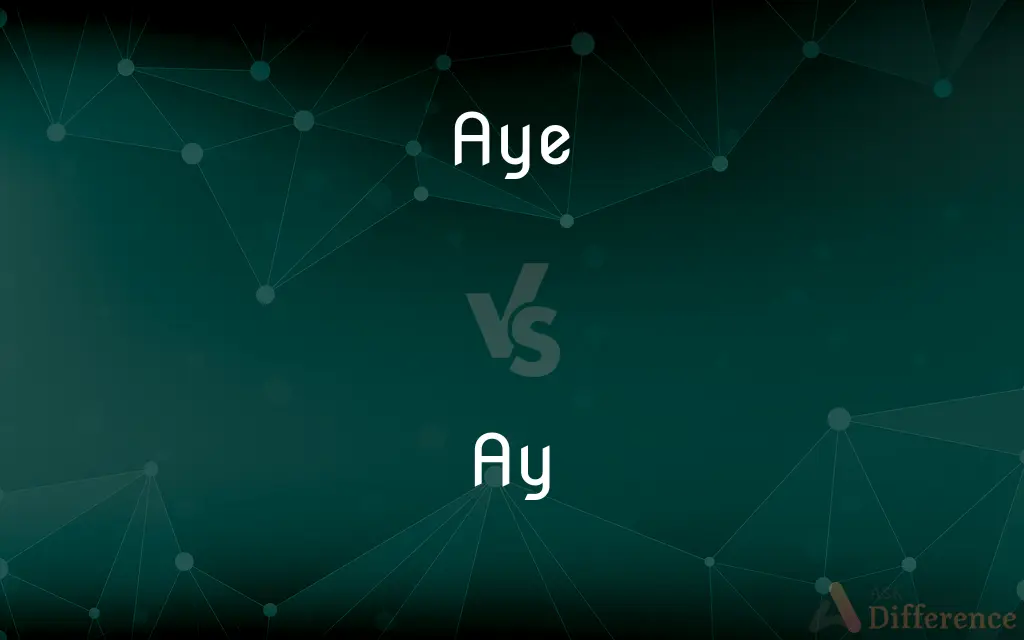Aye vs. Ay — What's the Difference?
By Fiza Rafique & Maham Liaqat — Updated on March 25, 2024
Aye signifies agreement or affirmation, often used in voting, while Ay conveys sorrow or lament.

Difference Between Aye and Ay
Table of Contents
ADVERTISEMENT
Key Differences
Aye is commonly used to express agreement or to affirm something, especially in formal votes or nautical contexts. On the other hand, Ay is an exclamation that expresses distress, regret, or sorrow, often found in literary or historical texts.
Aye is predominantly used in formal settings like meetings, conventions, and parliamentary procedures, indicating assent. Whereas Ay is more poetic and archaic, frequently appearing in plays, poetry, and narratives to convey emotional pain or lamentation.
The pronunciation of Aye is similar to the word "eye," emphasizing its distinct identity from the nautical 'Aye, Aye,' which means "I understand and will obey." In contrast, Ay is pronounced as a long 'i' sound, akin to sighing, which befits its use in expressing lament.
Aye's usage extends beyond verbal affirmations; it's also found in written motions and resolutions, symbolizing consent or approval. Conversely, Ay, with its literary leanings, enriches dialogues and monologues, adding a layer of emotional depth or historical context.
Aye, in its simplicity, serves a practical purpose in governance and decision-making processes, facilitating clear and concise expressions of agreement. Ay, however, with its nuanced expression of sorrow, enriches language with emotional and poetic depth, offering a window into the human condition.
ADVERTISEMENT
Comparison Chart
Meaning
Agreement or affirmation
Expression of sorrow or lament
Usage Context
Formal votes, nautical settings
Literary, historical texts
Pronunciation
Similar to "eye"
Long 'i' sound
Function in Language
Expresses consent or agreement
Conveys emotional pain or lamentation
Typical Settings
Meetings, parliamentary procedures
Plays, poetry, narratives
Compare with Definitions
Aye
It serves as a formal expression of consent.
In the assembly, her proposal was met with a resounding aye.
Ay
Ay is an exclamation expressing sorrow or regret.
Ay, what a tragic fate befell the hero, the bard lamented.
Aye
In maritime contexts, aye means "yes" or acknowledges an order.
The sailor responded with aye, aye, captain to confirm the command.
Ay
Often found in literature to express emotional depth.
Ay, the loss was great, and the poet's verses captured the heartache.
Aye
Aye signifies agreement, often used in formal settings.
The council members voted, saying aye to approve the new policy.
Ay
Used historically to convey distress.
Ay, the times are hard, remarked the old villager.
Aye
Aye is used as a term of vote, indicating approval.
When the chairman called for votes, the majority responded with aye.
Ay
Ay enhances the emotional tone in poetry and drama.
Ay, me! For aught that I could ever read, begins a famous soliloquy.
Aye
Aye can also mean always or forever in Scottish English.
He's been aye loyal to his team, through thick and thin.
Ay
Ay encapsulates feelings of grief or sorrow.
She sighed, Ay, if only things were different.
Aye
An affirmative vote or voter
The ayes outnumber the nays on this issue.
Ay
Ay was the penultimate pharaoh of ancient Egypt's 18th Dynasty. He held the throne of Egypt for a brief four-year period in the late 1300s BC. Prior to his rule, he was a close advisor to two, and perhaps three, other pharaohs of the dynasty.
Aye
Yes; yea
Voted aye on the appropriations bill.
Ay
Used before me to express distress or regret.
Aye
(Archaic) Always; ever
Pledged their love for aye.
Ay
Variant of aye1.
Aye
(archaic) ever, always
Ay
Variant of aye2.
Aye
Yes; yea; a word expressing assent, or an affirmative answer to a question.
Ay
Ah! alas!
Aye
(nautical) a word used to acknowledge a command from a superior, usually preceded by a verbatim repeat-back.
Ay
Alternative spelling of aye("yes")
Aye
An attention grabber
Aye, come here!
Aye, what do you have?
Ay
Alternative spelling of aye("yes")
Counting the ays and the noes in a vote
Aye
(NZ) ay (question tag)
Ay
Always; ever; continually; for an indefinite time.
Aye
An affirmative vote; one who votes in the affirmative.
"To call for the ayes and nays;" "The ayes have it."
Ay
Ah! alas!
Aye
Yes; yea; - a word expressing assent, or an affirmative answer to a question. It is much used in viva voce voting in legislative bodies, etc.
Ay
Same as Aye.
Aye
Always; ever; continually; for an indefinite time.
For his mercies aye endure.
Common Curiosities
Does "aye" have any other meanings besides agreement?
Aye can also mean always or forever, especially in Scottish English.
Can "aye" be used outside of formal settings?
While typically used in formal settings, aye can also be used colloquially to affirm something emphatically.
Is "ay" still commonly used today?
Ay is less common in everyday speech and is mostly seen in literary or historical contexts.
Can "ay" be used in modern speech?
While not common, ay can be used in modern speech, especially for dramatic effect or in poetic expressions.
Do "aye" and "ay" have any variations in spelling?
Aye is sometimes spelled "ay" in historical texts, but in contemporary usage, "aye" for agreement and "ay" for lament are standard.
What does "aye" mean in voting?
Aye means yes or agreement in a voting context, signifying approval.
In what contexts might one encounter the word "ay"?
Ay is often encountered in literature, poetry, plays, and historical narratives to express sorrow or lament.
Is "aye" specific to English-speaking countries?
Aye is used in English-speaking countries, particularly in formal or nautical settings, and is not specific to any one country.
How does one respond to "aye" in a conversation?
In a conversation, a response to "aye" would depend on the context, but it could be an acknowledgment or a reciprocal agreement.
How is "ay" pronounced, and does it differ from "aye"?
Ay is pronounced with a long 'i' sound, similar to the word "sigh," differing from the pronunciation of aye, which is like "eye."
Is "aye" considered formal language?
Yes, "aye" is considered formal, especially in voting or nautical contexts.
Are there any famous quotes or literary works that feature "ay"?
Yes, Shakespeare and other classic literature often feature "ay" in dialogues to express sorrow or reflection.
Is there a specific gesture or body language associated with "aye" or "ay"?
No specific gesture accompanies "aye" or "ay," though "ay" might be accompanied by expressive body language in dramatic renditions.
Can "ay" convey emotions other than sorrow?
Primarily, "ay" conveys sorrow, lament, or regret, but it can also express disbelief or concern in certain contexts.
Share Your Discovery

Previous Comparison
Spent vs. Spend
Next Comparison
Breath vs. BreadthAuthor Spotlight
Written by
Fiza RafiqueFiza Rafique is a skilled content writer at AskDifference.com, where she meticulously refines and enhances written pieces. Drawing from her vast editorial expertise, Fiza ensures clarity, accuracy, and precision in every article. Passionate about language, she continually seeks to elevate the quality of content for readers worldwide.
Co-written by
Maham Liaqat













































